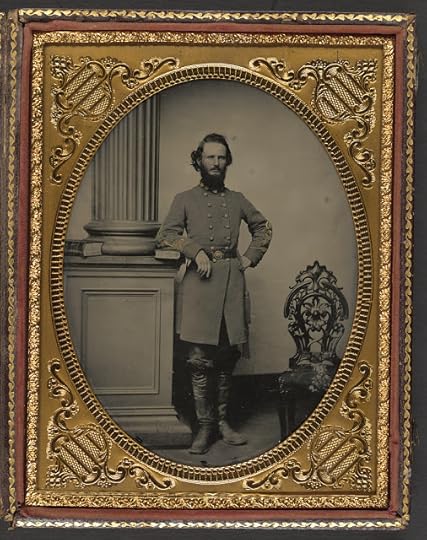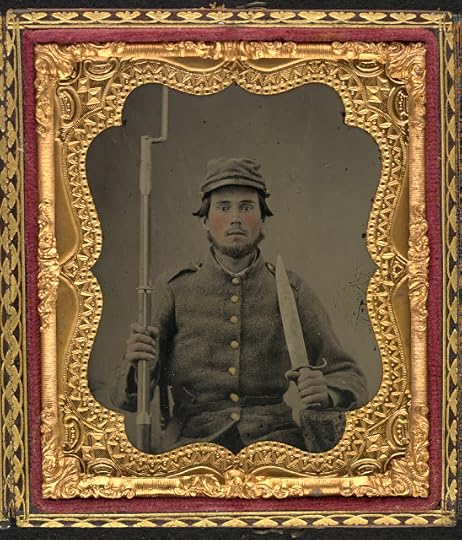A Hot Time in Virginia: On Cedar Mountain with the 14th Georgia
The initial moments entering combat at Cedar Mountain were anything but encouraging to the men of the 14th Georgia. The regiment had scarcely entered the field when the colonel suffered a wound in his hand, forcing him to turn over command to the lieutenant colonel Once the men got into line, the sight before them dripped with peril as remembered by one veteran.
"Emerging from the woods near the road by which the brigade had approached the field, it was met by General Taliaferro’s brigade, Jackson’s division, falling back before the advancing enemy," he wrote. "The 14th was cut off from the brigade by Taliaferro’s retreating men. Some of the men of the 14th faltered for a moment. The danger of a panic was imminent. The enemy, encouraged by the retreat of Taliaferro’s brigade and confident of victory, were advancing and about reaching a point at which their line would have prolonged our battleline and were within a stone’s throw of and on the flank of Purcell’s Battery. This was a critical and trying time, but it lasted only a moment. Colonel Folsom caught the colors of the 14th Georgia and bearing them forward, called upon his officers and men to follow. Nobly and gallantly did they respond to the call. Without flinching, the 14th advanced to meet the confident foe and by their well-directed volleys soon brought them to a stand."
This account of the Battle ofCedar Mountain, penned by a soldier in the 14th Georgia Infantrywriting under the penname of “Dixie,” first saw publication in the August 21,1862, edition of the Atlanta Southern Confederacy newspaper.
 Colonel Felix Price of the 14th Georgia Infantry was wounded in the hand early in the engagement at Cedar Mountain; regimental command devolved upon Lieutenant Colonel Robert Folsom.
Colonel Felix Price of the 14th Georgia Infantry was wounded in the hand early in the engagement at Cedar Mountain; regimental command devolved upon Lieutenant Colonel Robert Folsom. There are fewregiments from Georgia that have seen harder service than the 14th;since the Battle of Seven Pines, it has been in six general engagements in eachof which it has acquitted itself with honor to the state from which it hails.In some of these battles, it lost as high as 25% of the number carried intoaction.
But the proudest day for the 14thGeorgia, as it was for many others, was the 9th of this month at theBattle of Cedar Run between Orange and Culpeper Courthouses. The regiment is inGeneral A.P. Hill’s division and composes part of the Third Brigade, consistingof the 14th, 35th, 45th, and 49thGeorgia regiments, commanding by acting brigadier Edward L. Thomas, colonel of the35th Georgia.
The day was oneof the hottest ever felt and the troops were marched from daybreak until 3 p.m.when the Third Brigade filed off from the road to some woods on a high hillcommanding a view of the valley beyond for several miles. This position hadbeen selected by General Jackson as his temporary headquarters. In the distancecould be seen a Yankee force of cavalry on picket and still farther on werevisible moving bodies of men and wagons rolling up dense clouds of dust. Ourartillery was winding along the base of the mountains through thickets andalong the little ravines for the purpose of getting into position. Long line ofslow marching infantry was following different directions, their bright musketsgleaming in the light of the evening’s sun while now and then a solitaryhorseman might be seen dashing along the valley now so quiet and peaceful, butsoon to be the scene of fearful noise, confusion, pain, and death.
Meanwhile OldStonewall sat quietly studying a map spread out before him. At length, a signalflag near him gave a single wave down, an instant after the boom of a cannonaway down the valley reverberated through the mountains and along the valley.The ball struck in the midst of the Yankee cavalry and those hitherto statue-likelooking beings suddenly became wonderfully animated. They put into exercisetheir powers of locomotion and went scampering away at the top of their speed.Cannon was answered by cannon and battery by battery. Clouds of smoke and dustwent rolling up and spreading out over the valley. It was not about 4 p.m.Colonel Thomas (35th Georgia) was ordered to the field near thecenter of the line and in supporting distance of Purcell’s Battery. Colonel Felix Price of the 14th Georgia was wounded in the hand and retired beforethe regiment was brought actively into the engagement; the command thendevolved upon Lieutenant Colonel [Robert W.] Folsom.
Emerging fromthe woods near the road by which the brigade had approached the field, it wasmet by General Taliaferro’s brigade, Jackson’s division, falling back beforethe advancing enemy. The 14th was cut off from the brigade byTaliaferro’s retreating men. Some of the men of the 14th falteredfor a moment. The danger of a panic was imminent. The enemy, encouraged by theretreat of Taliaferro’s brigade and confident of victory, were advancing andabout reaching a point at which their line would have prolonged our battlelineand were within a stone’s throw of and on the flank of Purcell’s Battery.
This was acritical and trying time, but it lasted only a moment. Colonel Folsom caughtthe colors of the 14th Georgia and bearing them forward, called uponhis officers and men to follow. Nobly and gallantly did they respond to thecall. Without flinching, the 14th advanced to meet the confident foeand by their well-directed volleys soon brought them to a stand. The ground wasnow hardly contested, but the deadly aim of the Georgia boys was toodestructive for Yankee ideas of personal safety and their lines began to waverthen gave way.
 Private John Rigby of Co. D, 35th Georgia Infantry served in the same brigade as the 14th Georgia and fought alongside them at Cedar Mountain. He had been wounded at Mechanicsville during the Seven Days campaign and was later captured at the Wilderness. He died of acute bronchitis nearly a year later in Elmira, New York while still a prisoner of war.
Private John Rigby of Co. D, 35th Georgia Infantry served in the same brigade as the 14th Georgia and fought alongside them at Cedar Mountain. He had been wounded at Mechanicsville during the Seven Days campaign and was later captured at the Wilderness. He died of acute bronchitis nearly a year later in Elmira, New York while still a prisoner of war. They were closely followed upfor nearly a mile to where the route of the 14th crossed a road.Beyond this road was a small stream and beyond that a wheat field in which wasdrawn up a strong infantry force of the enemy. The road afforded our men anexcellent position from which they poured a most destructive fire into thelines of the enemy. Seeing the advantage and dreading the effects of our deadlyfire, one squadron of cavalry was sent out to drive us from the road. We sawthe cavalry advancing and without changing our position, we coolly awaitedtheir approach. When within 75-80 yards, Colonel Folsom gave the order to fireand down went horses and men by the score. Again, the valiant Yanks soughtsafety in hasty retreat and fled precipitately to the woods behind the wheatfield, closely followed by Georgia’s daring sons.
The regiment had advanced but ashort distance when Colonel Folsom fell from utter exhaustion. It was nownearly dark, the troops being much exhausted from the long march, hard fighting,and excessive heat. General Jackson though, under the circumstances, it wouldbe better to close the action for the night and accordingly pursuit of the flyingenemy was given up. They had been driven from the field and left hundreds oftheir dead and wounded behind. It was said by one of the generals who examinedthe filed that the 14th Georgia killed and wounded more men than itcarried into the field.
But it is not pretended that the14th Georgia was the only regiment in Colonel Thomas’s brigade thatacted gallantly. All did well. The 49th Georgia fired until they hadshot away their last cartridge. They then took what they could find on theYankees they had killed and afterwards charged the enemy with empty guns. The conductof the 35th Georgia and 45th Georgia is spoken of in themost flattering terms. It is said that this battle made the 24thtime that Colonel Thomas has been under fire. His conduct in action is characterizedby great coolness and unflinching bravery. It is understood that he hasreceived the appointment of brigadier general; the appointment is a good one.
The loss of the enemy isestimated at 1,700 killed and wounded plus 800 prisoners; our total loss was550. Our force engaged was about 14,000 men while that of the enemy was near30,000. The Yankees had one regiment busy all day burying their dead it isthough they did not get through. If our men had not been so exhausted and hadbeen able to follow up the enemy, there is no doubt the enemy would haveresulted in a complete rout. As it was, however, the victory was a decided oneand has added fresh laurels to the battle-worn heroes who so gallantly won it.
Source:
“Battle of Cedar Run,” from “Dixie,” an unknown soldier in the14th Georgia Infantry, Atlanta Southern Confederacy (Georgia),August 21, 1862, pg. 2
Daniel A. Masters's Blog
- Daniel A. Masters's profile
- 1 follower



